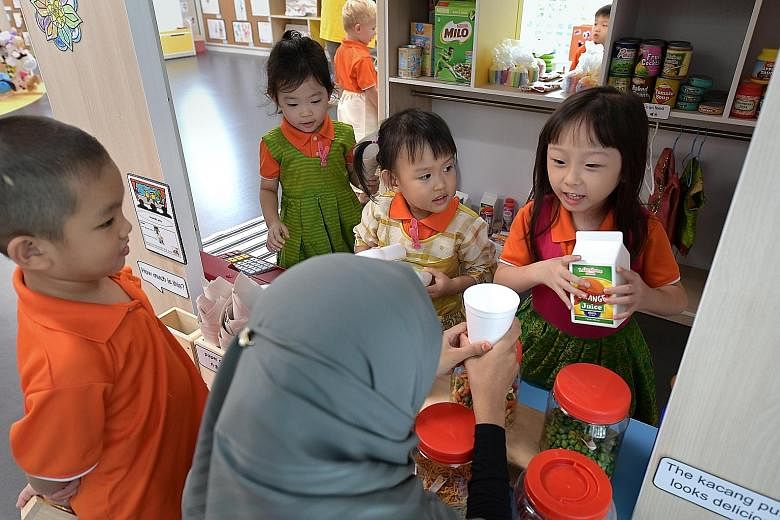NTUC First Campus is embarking on a study to learn how growing up bilingual affects other aspects of children's development, such as how they make friends, their mindsets and cognitive skills.
The initiative by one of the largest pre-school operators here is part of its efforts to understand how children acquire mother tongue languages.
NTUC First Campus said yesterday that it is partnering the Childhood Bilingualism Research Centre (CBRC) at the Chinese University of Hong Kong for the study, which will start this year. The centre is dedicated to studying childhood bilingualism and multilingualism.
The four-to five-year project, led by professors Virginia Yip and Stephen Matthews from CBRC, will explore factors in acquiring two languages.
In the first year, it aims to study about 100 three-to four-year-olds from My First Skool at 10, Jurong West, to find out how proficient they are in English and Mandarin, as well as general cognitive abilities.
They will be tested on their working memory, vocabulary, grammar and spoken language abilities.
The project hopes to study about 50 children aged five and six in the second year. The children will be given a storybook with pictures and no words, and asked to tell a story in both English and Mandarin to assess their language proficiency.
Their parents and teachers will possibly also do the same task, so that researchers can understand the language "input" for the children in their home and pre-school settings.
Dr Connie Lum, group mother tongue languages officer at NTUC First Campus, said that over the last two decades, more Singaporeans are speaking mostly English at home instead of their mother tongue. The pre-school operator will use the study's findings to improve the curriculum and activities across its centres.
Prof Yip said Singapore is a successful case of bilingualism, but it is also at a "delicate point".
"If parents are aware of the risk they face (in losing touch with their mother tongue), the situation can be reversible," she added.
Yesterday, Minister in the Prime Minister's Office Chan Chun Sing attended the official opening of the My First Skool centre at 10, Jurong West. The 1,500 sq m centre is one of five mega childcare centres announced by the Early Childhood Development Agency in 2015. It can take in 319 children aged between two months and six years.
The centre is meant to be a model in terms of teaching mother tongue languages and cultures in the pre-school sector. For instance, it has a space dedicated to bilingualism, with interactive games and displays.


